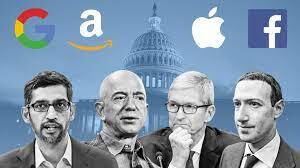The owners of Big Tech are the new Robber Barons. Linda McQuaig writes:
Like the Railroad Barons of the late 19th century, today’s Big Tech giants strut around, acting like they own the world (which they mostly do). Among their many imperious actions, they’ve taken to blocking Canadians’ access to our own news.
This is their high-handed response to Ottawa’s attempt to force them to pay Canadian publishers for news content, which Big Tech giants Google and Meta link to on their social media platforms.
Without some crackdown by Ottawa, Canadian publishers will have trouble staying in business, as Google and Meta (which owns Facebook, Instagram, etc.) are managing to scoop up billions of advertising dollars that used to support the Canadian media.
So, it’s easy to side with the Canadian media business — even though it’s largely dominated by corporate chains. (Torstar, which owns the Toronto Star, also owns a half-dozen smaller Ontario newspapers. The largest Canadian newspaper chain by far — owning about half of Canada’s newspapers — is Postmedia, which has a strong right-wing bias and is owned by a U.S. hedge fund.)
But the battle with Meta, Twitter, and all the rest isn't just about advertising revenue:
Ottawa’s intervention on behalf of Canadian media — important as it is — doesn’t even attempt to achieve what Canadians really need: more control over the digital universe that increasingly dominates our lives.
The core problem is that the technology that largely determines our access to the news — and just about everything else we do online — is controlled by a few Big Tech giants that are highly sophisticated in extracting money from us, governing how we search for information and, in the process, shaping public discourse and much else about the way we live.
What we need is a public digital infrastructure that is not beholden to private interests.
As James Muldoon, a political scientist at the University of Exeter, puts it: “I don’t think access to humanity’s collective knowledge should be controlled by a for-profit company.”
An open-source digital system — which would be publicly funded — could enable democratic governance, allowing independent media to flourish. And a public search engine — a publicly financed version of Google — could ensure us all access to the vast trove of human knowledge and information, without being routed in ways that limit our control and benefit private interests.
This may sound too wildly ambitious, but it’s really just an updated version of the wildly ambitious public takeover of the key, emerging market in the early 1900s — for electricity.
They wanted to create a new public infrastructure for hydro power, wresting control from the mighty private interests — dubbed “Water Barons” — who had taken over the transformative new power source.
This pitted them against the likes of powerful Toronto business mogul Henry Pellatt, who headed a syndicate pushing for rights to develop Niagara Falls power. (Pellatt is best known for the massive mansion he built for himself, which he called “Casa Loma.”)
But the popular movement for “public power” triumphed.
Shortly after his 1905 election, Conservative Premier James P. Whitney created Ontario Hydro, turning electricity into a public utility and declaring that water power “should not in the future be made the sport and prey of capitalists.”
This public takeover of electricity, ratified overwhelmingly by municipal voters, proved crucial to the province’s development. By ensuring low electricity rates, it enabled Ontario industry to compete with larger U.S. businesses.
Creating a public infrastructure for the digital world today could be just as transformative. But it would require the Trudeau government to be truly bold and innovative and actually challenge Big Tech’s power and control over our lives.
We've been here before.
Image: Institute For Cultural Evolution

6 comments:
I find the idea of modeling a public internet on Ontario Hydro attractive but highly ironic.
The world class utility and model public company was destroyed by successive Tory gov't who saddled Ontario with nuclear power. Then they appointed Maurice Strong who further 'financialized' the ailing giant. Finally McGinty's Libs put the nail in the coffin with gas-plant shenanigans.
We can't even keep the rich legacies bestowed by wiser generations. Good luck on building new ones.
Much has been done to try and obliterate public power. We live in a world where everything is for sale, PoV. But it doesn't have to be that way.
The Canadian public is being misled by articles like those form Ms McQuaig. I would recommend this explanation (also from the site Progressive Bloggers) AD
https://billwittur.com/bill-c-18-has-created-a-media-mess/
It's not just about money, AD. It's about control.
Yes, it is about control. Right now if Muskk decides he doesn't want anything on his media which talks about the enviornment or child care, it can be eliminated. If hate is written onto this form of media, it can be printed and read.
Not wanting to pay for some one else's work is theft. These corporations are worth billiones and they don't want to pay for some else's work product, that isn't about the money. Its about control. guys like musk like to control things. when he bought twitter he thought he had control over a lot of things, now he wants more control. The owner of Goggle is not in touch with the real world,
if governments can not control these corporations to play "civilized" business, then it is time citizens were able to access something else and that can be provided by government. Once the media is control by a few people,, there goes democracy.
That's exactly the problem, e.a.f.
Post a Comment